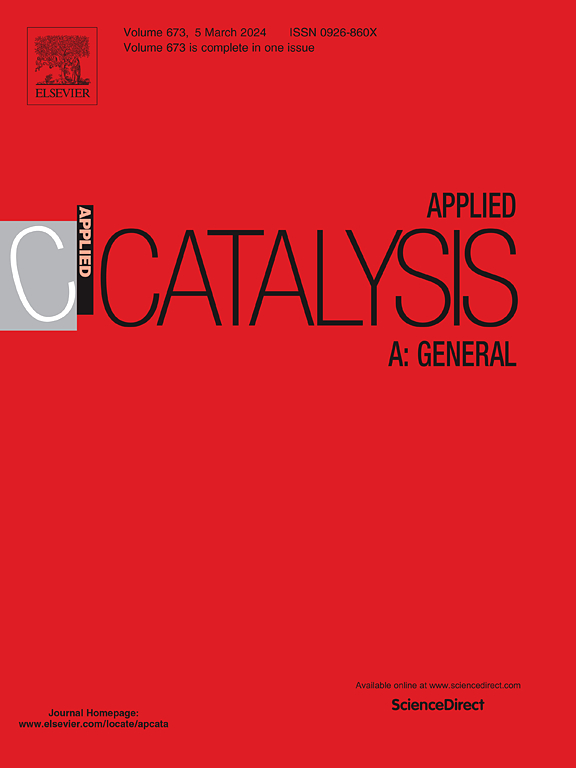定制孔,增强活性:用于乙烯聚合的多孔有机聚合物负载茂金属催化剂
IF 4.8
2区 化学
Q2 CHEMISTRY, PHYSICAL
引用次数: 0
摘要
在合适的载体上固定茂金属催化剂可以克服其均相催化剂催化烯烃聚合的缺点。然而,开发具有可调比表面积、孔结构和良好的茂金属催化剂负载相容性的多孔有机载体仍然具有挑战性。在本研究中,通过芳香族共聚物单体的直接编织,采用一锅法成功制备了具有可调比表面积(158-1407 m2/g)和孔体积(0.15-1.04 cm3/g)的多孔有机聚合物(POPs)。研究了POPs负载型茂金属催化剂的比表面积、孔结构和化学结构对乙烯催化聚合的影响。结果表明,POPs、MAO和Cp2ZrCl2之间的相互作用决定了活性位点的形成和空间分布以及整体催化活性。催化动力学结果表明,在乙烯聚合过程中,pops负载的茂金属催化剂没有引发期。当载体比表面积为438 m2/g,孔体积为0.26 cm3/g时,催化活性为20513 kgPE(mol Zr)−1h−1。这项工作突出了持久性有机污染物作为定制的多孔有机聚合物载体用于茂金属催化乙烯聚合的巨大潜力。本文章由计算机程序翻译,如有差异,请以英文原文为准。
Tailored pores, enhanced activity: Porous organic polymer-supported metallocene catalysts for ethylene polymerization
Immobilizing metallocene catalysts on suitable carriers can overcome the drawbacks of their homogeneous counterpart in catalyzing olefin polymerization. However, the development of porous organic carriers with tunable specific surface area, pore structure and commendable compatibility for metallocene catalyst loading remains challenging. In this study, porous organic polymers (POPs) with tunable specific surface area (158–1407 m2/g) and pore volume (0.15–1.04 cm3/g) were successfully fabricated by a facile one-pot method through direct knitting of aromatic copolymer monomers. We provided a comprehensive investigation into the impact of specific surface area, pore structure and chemical structure of POPs on the catalytic polymerization of ethylene as POPs-supported metallocene catalysts. The results reveal that interactions among POPs, MAO and Cp2ZrCl2 govern both the formation and spatial distribution of active sites as well as the overall catalytic activity. The catalytic kinetics show that the POPs-supported metallocene catalysts exhibited no initiation period during ethylene polymerization. And the catalytic activity (20513 kgPE(mol Zr)−1h−1) is reached with a support possessing a specific surface area of 438 m2/g and a pore volume of 0.26 cm3/g. This work highlights the significant potential of POPs as tailor-made porous organic polymer carriers for metallocene-catalyzed ethylene polymerization.
求助全文
通过发布文献求助,成功后即可免费获取论文全文。
去求助
来源期刊

Applied Catalysis A: General
化学-环境科学
CiteScore
9.00
自引率
5.50%
发文量
415
审稿时长
24 days
期刊介绍:
Applied Catalysis A: General publishes original papers on all aspects of catalysis of basic and practical interest to chemical scientists in both industrial and academic fields, with an emphasis onnew understanding of catalysts and catalytic reactions, new catalytic materials, new techniques, and new processes, especially those that have potential practical implications.
Papers that report results of a thorough study or optimization of systems or processes that are well understood, widely studied, or minor variations of known ones are discouraged. Authors should include statements in a separate section "Justification for Publication" of how the manuscript fits the scope of the journal in the cover letter to the editors. Submissions without such justification will be rejected without review.
 求助内容:
求助内容: 应助结果提醒方式:
应助结果提醒方式:


